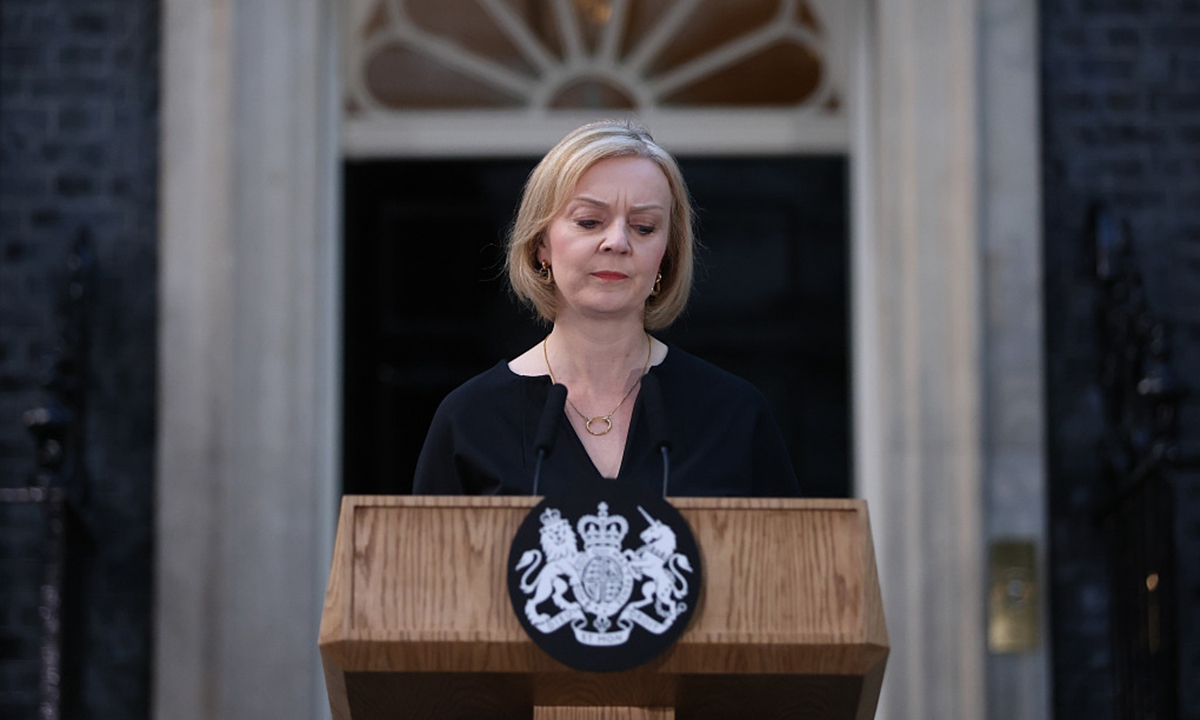
UK Prime Minister Liz Truss Photo:VCG
UK Prime Minister Liz Truss resigned Thursday after just 45 days in office following her failed tax-cutting plan, becoming the shortest-serving prime minister in British history, media reported. This dramatic U-turn in her political life could also be seen as a microcosm of failing Western politics, when the Anglo-Saxon pattern cannot lead the world as the long-term practice of Western democracy cannot solve emerging new problems, Chinese experts said.
Truss said in a short speech outside Downing Street on Thursday that she could not deliver the mandate on which she was elected by the Conservative Party. "I have therefore spoken to His Majesty the King to announce that I am resigning as leader of the Conservative Party," she said.
Truss also said that she would remain in her post until a successor formally takes over as party leader and is appointed prime minister by King Charles III, BBC reported.
Bloomberg said Truss quit as UK prime minister after "a brief and chaotic tenure" with a massive package of tax cuts before unwinding most of it in the face of a market rout. Her departure leaves the ruling Conservative Party badly damaged, and her undoing was ultimately due to a lack of political instinct and awareness of economic reality, the media report said.
A growing number of lawmakers had called for Truss to resign after weeks of turmoil sparked by her economic plan. When it was unveiled by the government in September, the plan triggered financial turmoil and a political crisis that has seen the replacement of Truss' Treasury chief, multiple policy U-turns and a breakdown of discipline in the governing Conservative Party.
"Truss' resignation first shows that Britain's institutional problems are serious," Cui Hongjian, director of the Department of European Studies at the China Institute of International Studies, told the Global Times on Thursday. The country's original set of political solutions and its institutions are unable either to support the practical problems that the country is facing or to fix the divisions within the party, Cui said.
Also, Truss herself, and the Tory Party, as a traditional center-right party, have been severely influenced by populism. They wanted to deliberately close the distance between the so-called political elites and ordinary people but can't find a professional solution for this process, he said.
Truss' downfall started when her former chancellor Kwasi Kwarteng announced his mini-budget a month ago, which prompted weeks of economic turmoil and eventually led to him being sacked on October 14, Sky News said.
The embattled UK leader later apologized for threatening the UK's economic stability and said she was sorry for "going too far and too fast" as markets tumbled and investors dumped the pound and government bonds.
"It also shows that the Anglo-Saxon pattern can't lead the world, as those old measures such as tax cuts can't solve new problems," Wang Yiwei, director of the Institute of International Affairs at Renmin University of China, told the Global Times on Thursday.
The UK is now facing multiple crises including the Ukraine conflict, energy shortages, inflation and depreciation of the pound, some of which are directly related to the US-led decoupling with China, in addition to rising protectionism, Wang said. "The UK government has not found a new growth momentum and those economic woes eventually triggered the bigger political crisis."
Some media reported that her resignation followed a day of chaos, as the home secretary Suella Braverman also resigned on Wednesday over a security breach involving a government document. Truss also appeared at a stormy session of prime minister's questions in Parliament where she repeated her apology for her disastrous fiscal program.
While a leadership election will be held within the next week to find Truss' replacement, leading candidates include some key figures from her cabinet, The New York Times said, and some analysts have even speculated that Boris Johnson, who resigned as prime minister in the summer, could make a return.
Britain is known as the founder of Western democracy, and while it should have had rich experience in its practice, it seems that it is helpless in dealing with new problems and a complex environment.
For the British government now, the only possible solution to those problems is constantly replacing "prime ministers," and Truss' resignation could become a tool with which the internal factions of the Tory Party fight each other, Cui noted.
"It is difficult for any new leader to solve problems in the short term, and whoever succeeds Truss may encounter all kinds of problems, and they may make mistakes as well. These alleged policy mistakes could then become cannon fodder for their political opponents within the party, which, rather than bridging the divide within the party, could intensify political strife," he said.
In the eyes of some Chinese experts, Truss' dramatic resignation could also be seen as a microcosm of the decline in Western politics, as only replacing leaders without changing the mindset will not solve any problem.




